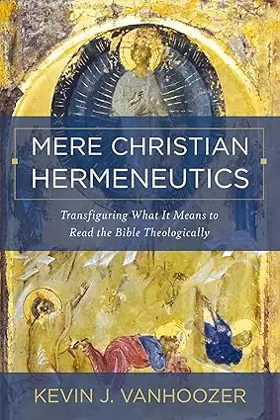

Mere Christian Hermeneutics: Transfiguring What It Means to Read the Bible Theologically
Pages
448
Publisher
Zondervan Academic
Published
10/1/2024
ISBN-13
9780310234388
How can we read the text of Scripture well, rightly, and faithfully? Theologian Kevin J. Vanhoozer believes the two greatest challenges in developing a theory of interpretation are, first, the de facto variety of actual interpretations of the Bible and, second, the plurality of reading cultures--denominational, disciplinary, historical, and global interpretive communities--each with its own preferred frame of reference. A cynical observer might say that the one thing Christians have never agreed on is how to interpret the Bible, or even on the meaning of the "literal sense."
In response, Vanhoozer offers Mere Christian Hermeneutics. The allusion to C. S. Lewis's Mere Christianity is no accident. A "mere" Christian hermeneutic--that is, principles for reading the Bible as Scripture everywhere, at all times, and by all Christians--represents both a challenge and a promise. With this book, Vanhoozer seeks to fulfill the promise without degenerating into a bland ecumenical tolerance of conflicting opinions. Rather, he turns to the accounts of Jesus' transfiguration, a key moment in the broader economy of God's revelation, to suggest that spiritual or "figural" interpretation is not a denial or distortion of the literal sense but, rather, its glorification. He calls both church and academy to develop reading cultures that enable and sustain the kind of unity and the kind of diversity that "mere Christian hermeneutics" calls for and encourages.
In response, Vanhoozer offers Mere Christian Hermeneutics. The allusion to C. S. Lewis's Mere Christianity is no accident. A "mere" Christian hermeneutic--that is, principles for reading the Bible as Scripture everywhere, at all times, and by all Christians--represents both a challenge and a promise. With this book, Vanhoozer seeks to fulfill the promise without degenerating into a bland ecumenical tolerance of conflicting opinions. Rather, he turns to the accounts of Jesus' transfiguration, a key moment in the broader economy of God's revelation, to suggest that spiritual or "figural" interpretation is not a denial or distortion of the literal sense but, rather, its glorification. He calls both church and academy to develop reading cultures that enable and sustain the kind of unity and the kind of diversity that "mere Christian hermeneutics" calls for and encourages.